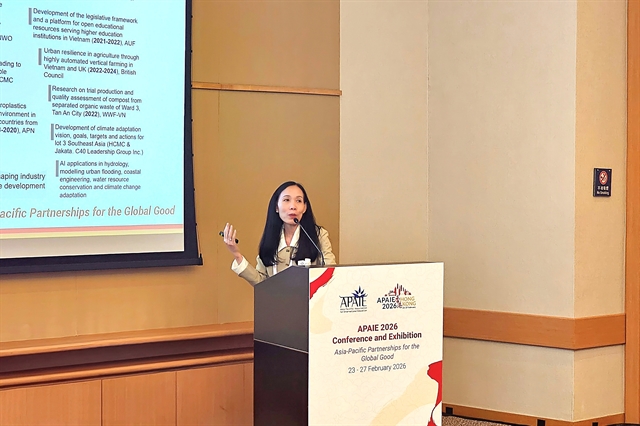 Society
Society

 |
| Deepfake technology has been increasingly used in scams, causing public concern. Photo courtesy of Bing |
HÀ NỘI — Cybercriminals have begun deepfake video technology to make fraudulent calls and appropriate money.
Đặng Anh Quang, living in Hà Nội’s Hai Bà Trưng District, received an urgent request to borrow money from the Zalo account of his best friend.
He received a video call during which he could see his friend’s face and hear his voice. He did not hesitate and sent VNĐ20 million to the bank account mentioned in the Zalo chat.
Quang then found out that he was scammed by deepfake technology.
“The face I saw in the video call was quite a blur," he told Vietnam News Agency. "He spoke a few words, then the call was interrupted. I thought the internet connection was bad.”
According to Kaspersky, deepfake videos are a portmanteau word - 'deep' from 'deep learning' and 'fake'.
Deep learning is an advanced Artificial Intelligence (AI) method which uses multiple layers of machine learning algorithms to extract progressively higher-level features from raw input.
It can learn from unstructured data - such as the human face. For instance, according to Kaspersky, AI can gather data on your physical movements.
Deepfake technology has created video technology products with sound and images that fake real-life objects with high accuracy. The fake video will look more real as the technology collects more data about the shape and voice of social network users.
Dr Đinh Viết Sang, deputy director of the International Research Centre on Artificial Intelligence, Hanoi University of Science and Technology, said videos and images of individuals posted on social network platforms are sources for criminals to create fake videos.
Cybersecurity expert Vũ Thanh Thắng from Smart Cyber Security Company said scammers appropriated Zalo and Facebook accounts and used videos and photos of those accounts to create deepfake videos for online fraud purposes.
They send messages to friends to borrow money. The deepfake videos aim to earn the trust of victims, according to Thắng.
Those deepfake videos last only a few seconds, often with unclear images and sound. The calls are interrupted like being due to connection failure.
According to Vũ Ngọc Sơn, technology director of NCS Network Security Company, the tricks and forms of fraud are not new, but the fraudsters are now applying advanced technology. The possibility of success is higher.
The development of AI and applications like deepfake helps an ordinary person, who does not need to be good at technology or graphics processing, to create photo, video and voice collages easily.
He warned that online fraud using deepfake would grow in the future because the amount of money appropriated is huge while the scammers do not have to spend lots of effort.
According to the Ministry of Information and Communications (MIC), more than 3,200 fraudulent websites were detected in the first three months of 2023 in Việt Nam.
Trương Đức Lượng, chairman of Vietnam Network Security JSC (VSEC), said raising awareness about online safety was still an effective measure with optimal cost. This should be done regularly, in various ways, divided into topics and objects so that the community could regularly receive messages and remember more.
Expert Ngô Minh Hiếu from MIC’s National Cyber Security Centre (NCSC) said to avoid scams people should be alert in every situation.
“When receiving a money transfer request, it is necessary to calm down and make a direct call for more than a minute with different questions to verify the information," he said.
“Deepfake has not been able to fake a real-time chat. The people’s emotions cannot be imitated.”
Võ Dương Tú Diễm, regional director of Việt Nam, Cambodia and Myanmar region of Kaspersky Global Cybersecurity Company, recommended regular backups, as well as strong and different passwords for personal accounts to avoid theft.
Businesses should ensure that employees are informed about how deepfake technology works and the potential risks of fraud.
Everyone should to build a “sceptic” attitude towards voice messages and video calls. He said this might not guarantee you are safe from scams, but it could help avoid many pitfalls.
Lieutenant Colonel Triệu Mạnh Tùng, deputy director of the Department of Cyber Security and High-Tech Crime Prevention, Ministry of Public Security, said the ministry had worked with MIC and the State Bank on improving the quality of personal ID and bank accounts and look to the future when the owner must open bank accounts.
The websitedauhieuluadao.com, created by Google and NCSC, provides three golden rules to help prevent scams.
The first rule is "Slow down". Since scammers often create a sense of urgency to catch users off guard, people are advised to take the time to clarify further what needs to be transferred.
The second principle is "Spot check" to validate the information you receive.
If you receive an unsolicited call, look up the information, contact, and re-verify the source of the information.
The third rule is "Stop! Don't send". If you feel that transferring money to an unknown account is unreliable, stop, as it could be a scam. — VNS




